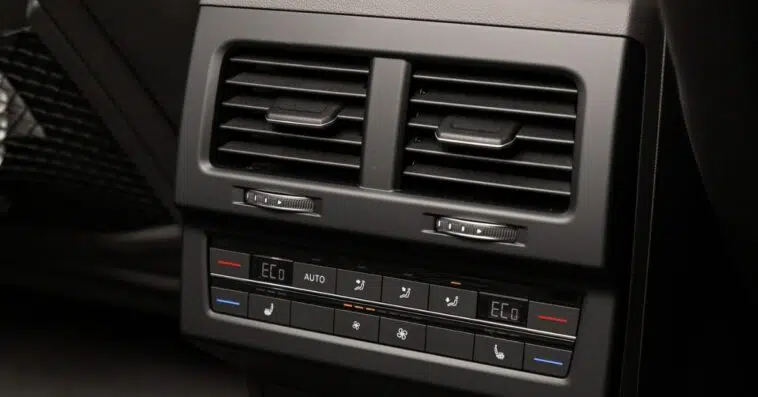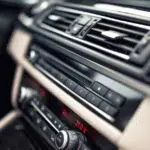The AC in a car feels great. And it helps to cope with the hot days. And like every other day, you turned on the AC, but suddenly you notice that the interior feels warm.
Well, if this happens, you might need to visit your mechanic.
If your car starts to overheat only when you have turned on the AC, it is pretty clear that there is something wrong with the compressor, the pump, or the condenser.
If you have a faulty compressor, your call will start to overheat, and your condenser and the pump are ineffective. It can also affect overheating.
If you get to see any of the symptoms, do not use your AC until fixed.
If your car is overheating due to the working of the AC, your engine will start to heat up, the dashboard and seats will begin to heat.
Here is why your car overheats when ac is on:
- Greater Load On The Compressor
- Ineffective Cooling
- Malfunctioning Fan
- Faulty Temperature Sensor
- Defective Car Components
Car overheating, especially when the AC is on, can be due to many possibilities. These problems come with heavy expenses; as you know, overheating issues is a crucial and complex issue.
Let us take a closer look at the problems making your car overheat, especially when the AC is turned on.
TABLE OF CONTENTS
5 Causes Of Overheating When AC Is On
1. Greater Load On The Compressor
It is a fact that the AC system draws a lot of power from your car engine and creates a significantly more tremendous amount of pressure on the compressor, which the compressor is unable to handle. Also, the compressor puts rotational force on the engine.
The compressor having an excessive amount of load is the most common reason and is a significant problem.
The moment you turn on your AC, its compressor starts to behave and operate as an engine. And the compressor then shifts the refrigerant cylinders to get them compressed.
This puts a lot of pressure on the engine. And, when the compressors deal with more significant stress than they can handle, it results in overheating your car.
Therefore, to be sure of this issue, you need to check whether your engine is getting overheated or not. If yes, consult with your mechanic immediately.
2. Ineffective Cooling
The primary purpose of installing a cooling system is to help the condenser maintain its operating temperature and keep it cool, as it plays a very vital role.
When you turn on the AC, the AC system makes the liquid refrigerant move through the condenser.
Then, the condenser starts heating up, and the engine fan airs it to maintain its temperature.
However, if you have a jammed engine fan, the condenser’s temperature will rise rapidly, and eventually, it will result in overheating the engine.
Furthermore, another reason can cause your engine to overheat, i.e., when the condenser or radiator tubes get blocked.
When the liquid passes through the pipes, the corrosion particles or rust can cause a blockage.
This clogging will prevent the liquid refrigerant and coolant from flowing as they should and will cause overheating.
Therefore, clogging is a significant issue and needs to be fixed as soon as possible.
Inspecting your radiator and condenser may give you a hint to figure out why your car is overheating.
3. Malfunctioning Fan
Car overheating is inevitable when you have a malfunctioning fine for the engine. If your car is overheating even when at low speeds, it can be caused by a faulty engine fan.
This problem arises when there is insufficient airflow through the condenser or radiator. Chances are, the fan’s fins could be clogged, or the radiator and condenser may be blocked.
Also, you need to see if your fan’s switch is damaged. And do consider getting a new fan. Faulty fans create a lot of issues in a car.
4. Faulty Temperature Sensor
Fault with the temperature sensors is pretty rare, but it is not impossible.
These sensors help measure the coolant temperature, and if needed, you can then compare it with the indicator mounted on the dashboard.
You never know; it may show regular readings with engine overheating. Do check the thermostat if you encounter these issues.
This case is infrequent, but you never know; it can cause all this overheating.
To fix this, contact your mechanic without any further delay.
5. Defective Car Components
It is pretty common to have defective car components installed in your car, although elements lose their potential and begin to malfunction with time.
The defective components make your car overheat when you have your AC turned on.
If the elements such as refrigerant, condenser, compressor, and evaporate do not work as they are supposed to, it can result in increasing your car’s temperature.
To avoid these issues, you should have a routine check-up on the AC components of your car.
7 Solutions To Overheating When The AC Is Turned On
1. Refrigerant Compatibility
You should always check the compatibility of AC refrigerant with the vehicle you own.
It is pretty common not to have an AC refrigerant compatible with your car, which can impose problems on the AC in your vehicle.
Therefore, check the refrigerant that you are using in your car. You can do this with a bit of help from your mechanic or yourself if you know about gears.
2. Inspect The Radiator
The radiator is said to be the main component of your car’s cooling system. You may check the radiator’s cap if it is functioning correctly or not with a testing kit.
By checking the radiator, you can see if there is any leakage. Do make sure the radiator is topped with coolant.
3. Replace The Antifreeze
Antifreeze A.K.A coolant is a green-colored liquid that is used in regulating the temperature of the engine.
It has a high thermal capacity and is capable of preventing corrosion in your car. Also, it improves the durability of your vehicle.
If you wish to avoid such overheating issues, you should change your antifreeze or coolant every two years.
4. Flush The Trapped Air
Sometimes, there is an increase in the temperature of your car due to the air trapped in the coolant system. To resume proper functioning, release the air by flushing the coolant system.
5. Check The Compressor
To check your AC compressor, try to listen if there is any noise, and use a multimeter for checking the wires if they have proper voltage. Or, if you find any damage, replace your compressor.
6. Check The Pump
The water pump moves the water, taking it from the radiator to the motor in a complete cycle.
Look if the pump is damaged or is unable to work as it should. If yes, getting them fixed shall be your prime concern.
7. Check The Fluid Levels In The Radiator
If the engine starts to overheat, turn off the engine with the key in the ignition. Wait patiently for the engine to cool down and open the hood and check the fluid levels of the radiator.
If you find it low, replace it and add coolant and distilled water (50-50). Do not use regular water!
When your car is car is overheating, it would be that you no longer use the AC until you get this issue fixed.
What Should You Do When Your Car Overheats With Ac On In Traffic?
When you are stuck in traffic, you feel stressed, and you are irritated.
But guess what’s worse than that?
You’re stuck in traffic, your car is overheating, and your AC unit is on. It is a different life experience. So yes, it is just as worse as it sounds.
Here is what you should do to get this under control below:
- If you feel your car engine is overheating while the AC is on, pull over your car immediately.
- It happens in many places where you are unable to pull over your vehicle. If you are in this kind of state, consider turning off your AC, which might help cool down the engine. Though, see if it is possible to pull over and get your car to neutral.
- You have witnessed drivers pull over their cars and opening their car’s hood. This is one of the most common ways people use to cool the engine when in traffic. At times, steam comes out due to overheating. And if the hood feels hot, wait for it to cool down and then open the hood. This will help in letting out the trapped heat.
- When you get your car parked, turn off your engine, but the key should remain in the ignition. Keeping the key in ignition will allow the fan to keep running and cool it down. However, if you don’t hear your fan working, perhaps the fan must be the one causing all the overheating.
- It will take approximately 30 minutes for your car to cool down. Right after the engine cools down, you need to check if there are any leakages with radiator tapes or loose clamps, etc. this is a quick scan of your engine.
If you find any leakages or loose clamps, consult with your professional mechanic to help you fix this to avoid problems in the future.
Frequently Asked Questions
Q1. How Does A Lousy Thermostat Affect My Car?
Having a bad thermostat in your car can result in unnecessary overheating. It is a valve installed in the cooling system that regulates the temperature of liquids.
It allows the coolant to move through the components and regulates the temperature.
Having a bad thermostat can cause overheating, the poor performance of the engine, and fluctuating temperatures. Furthermore, it will not give you proper readings.
Q2. How Does A Faulty Compressor Affect My Car?
Yes, a faulty compressor can result in overheating issues for your car engine. If the compressor in your car is seized by any chance, the belt will be unable to perform as it should.
The belt is a connector between the clutch and crankshaft, which moves the compressor when you activate the engine.
Therefore, the belt is a vital component for your car, and of course, you can drive your car without the belt. However, you will end up overheating problems.
Q3. Is It Essential To Get My Car’s Air Conditioning Unit Recharged?
The AC unit is an entirely sealed system. If you feel that your AC is not working or not giving refreshing air, it is a sign that the Freon is running low. (Here’s how to check Freon level in your car).
Also, the AC units are very pressurized systems, and with time, these AC units can cause leakage. Once the Freon and pressure level of an AC unit drops low, it needs to be recharged.
Conclusion
Car overheats when ac is on widespread problem these days. This is a common car problem all over the world now.
Here in this article, I have mentioned the prime reasons which make your car overheat. Also, I have provided a solution that you can use to know which component is damaged.
After you find a problem, get this fixed by a professional because overheating can impose more significant threats and damages your car’s capabilities if you wait too long to get it fixed.
To avoid such things, I suggest you follow a routine for a complete engine check. This way, you can not only save money and keep your car and family safe.




